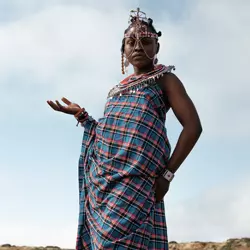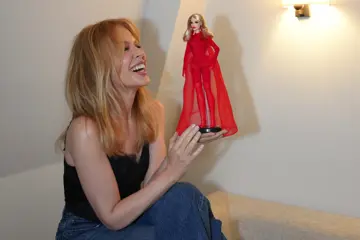 Elsy Wameyo
Elsy WameyoThe buzz South Australian singer, rapper and producer Elsy Wameyo hasn't just made some jams for her stellar debut EP, Nilotic. She's gone on a quest to understand her diasporic identity as an African-Australian. And it's an odyssey guided by faith, heritage and technology.
Wameyo is Zooming from her Adelaide base, dressed casually in taupe leisurewear with a buttercup-yellow manicure while regally seated on an animal-print chair – the room crisp-white and sunny. The rising star tells meandering – and absorbing – stories, the funniest about how she located horses for the panoramic video accompanying her poetic single River Nile.
During the pandemic, the poised Wameyo graduated from the University of Adelaide with a degree in Communication & Media Studies – her "dream" to be a journalist, if not news anchor. "I love to chat, I love conversations," she enthuses.
Wameyo's music is intertwined with personal experience. The narrative behind Nilotic – its title referencing the ethnic peoples of the Nile Valley – begins with her family's migration from Nairobi, Kenya to Adelaide when Wameyo was seven.
Don't miss a beat with our FREE daily newsletter
"It was definitely a big shock," Wameyo recalls. "I think, at the time, I didn't really have the concept of moving countries – it was just a thing that happened. But, once I stayed here for a while, I was like, 'Okay, we're not going back home.'"
The cultural slippage was bewildering. "It was really tricky because that age is kind of where you're really laying down the foundation of your values, your morals, and who you are – and trying to figure life out. I had already tapped into so much from back home – like just the music that we were listening to, the language that we're speaking, et cetera… But, then, coming now to Australia, and then having to speak English at home and at school and stuff like that, and dressing different or just seeing people that are dressed different, and being the outcast and being the outsider – it was an interesting shift.
"I think the one thing that I've battled with for a long time is that shift, even to this day. Hence, you know, something like Nilotic, because I always try to explain to people how I'll go back home and I sound like this. So they're like, 'You're not Kenyan.' But, then, I come here and I look like this. And they're like, 'You're not Australian.' So it's like, 'What am I?' You're just floating in the middle somewhere – no one really wants to accept you.
"So that's really the journey – and that's why I speak a lot about identity and, yeah, just trying to figure out who I am as that expat, and who we are as Africans or just ethnic people or people who just migrated from a different country coming into another world; another environment. It's just trying to figure out where then you fit – you know, what's the puzzle piece? Like, who are you and where do you fit, really?"
Initially, Wameyo pursued music because she was "pushed" by others commending her talent. "There were always people that were just saying, 'You need to make music; do this, do that.'" The earliest validation came from her singing in the church choir. "I was always surrounded by people who were constantly like, 'Oh my gosh, your voice is so beautiful. You're so gifted. When you sing, you move people,'" Wameyo remembers.
The young soul buff attended Adelaide's Northern Sound System, connecting with industry players. It was here Tkay Maidza started out, working with the local beatmaker BadCop, aka Mario Späte. "I sat with Tkay when she was doing her [2013 break-out] Brontosaurus, in that era," Wameyo reveals. "I sat in her studio sessions. We did, like, demos and just random things here and there." Soon, Wameyo was collaborating with Späte. "When Tkay kind of like became 'Tkay' and left, there was that gap," she says. "And so I think I almost like fit into that gap that Tkay left."
In the interim, Wameyo linked with the Playback 808 label collective – founder DyspOra offering her a live gig in 2017. She was buoyed by the crowd's love. "I think that was a turning point where I was like, 'Okay, cool – I wanna make music. I wanna produce and make music and write and inspire people.'" Wameyo performed alongside DyspOra on the ABC's Tonightly With Tom Ballard. In 2018, she debuted with a solo single, Intuition, helmed by Späte.
The Adelaide hip hop scene is known to be communal. Wameyo "was brushing shoulders with" even Hilltop Hoods early. "I look at them as like my older brothers-slash-dads-type energy, 'cause they're just very caring," she rhapsodises. Wameyo won the People's Choice for 'Hip Hop Act' at the South Australian Music Awards in 2019.
As a creative, Wameyo is unusually autonomous – singing, rapping and producing. Yet she worried about that fluidity. "I had always struggled as an artist that could sing and could somewhat rap and could just do a bit of everything," Wameyo shares. "I always thought it was a bad thing – 'cause I've always felt, 'Find your thing and do your thing.' But then I came to realise I had that upper advantage, 'cause I could just produce my own tracks and sing myself and rap myself." As such, Nilotic "showcases" her capabilities.
In fact, Wameyo ventured into self-production serendipitously. "I was really learning on the job," she says. In late 2019 Wameyo released Outcast, tipped to be the lead single from an EP for her new Melbourne label, Music In Exile. But, because of lockdown, she was unable to continue liaising with Späte. "I'm just there like, 'Okay, I can't just stop – like I can't just sit at home and not do anything.'" Späte suggested Wameyo set up a bedroom studio to cut her vocals to send him – and she applied for a grant. "I didn't really think to produce."
Still, what started as her adapting to COVID-19 became a pilgrimage. Wameyo "experimented" using Ableton, recording the Nilotic title-track. She penned the lyrics in response to the growing momentum of the Black Lives Matter movement following the murder of George Floyd, also ruminating on colonial trauma. "At that point, I was writing just how I was feeling, what I was thinking, and what I was seeing."
Wameyo's team were impressed, prompting her to produce more. "I was like, 'Okay, I've done a track, I've become a producer now, I'm doing the thing. Cool, cool, cool. Let me just do more, right? It wasn't that hard.'" Only she then endured writers' block for several months. Wameyo turned to her Christianity. "I guess, long story short, I had to humble myself."
Eventually, Wameyo decided on a change of scenery, heading to Melbourne – her original plan to relocate permanently. ("I packed my car with everything.") She'd crash with a sibling. "In that month, I locked myself in my brother's bedroom – and I just took over," Wameyo laughs. "I was like, 'Get out, this is my space!'
"I would sleep and I'd wake up and just roll into the studio – 'cause it was right there. So I would never leave that room. For the full month, it was prayer, supplication and production."
When Wameyo completed the Nilotic EP, it felt like more than a project. "If you were to come and tell me, 'I'm gonna take your hard drive with the EP and burn it,' I couldn't care less," she declares, "because there was something that was left within me spiritually that is much more important for me."
Astonishingly, the Nilotic EP traverses gospel, neo-soul, avant 'n' B, trap, Afrobeats and soundtrack music. One of the highlights is the figurative song Sulwe, celebrating a Black woman's arrival – Wameyo vocalising over a funky groove in Luo and Swahili. She was inspired by Lupita Nyong'o's bestselling children's book of the same title, the Oscar-winning actor another Nilot. "In the book, [Nyong'o] basically talks about 'sulwe', meaning 'star' [in Luo]. It's the beauty of a young Black girl and it's her Mum trying to explain to her how beautiful she is – 'cause she's not comfortable in her skin."
Wameyo confides that she, too, internalised Eurocentric beauty norms. "For me, I look at myself in such an evil way. I really wanted to put myself in that shoe where, like, I was empowering myself.
"It was really just trying to empower myself as a Black star and also I think wanting other people to journey within themselves and find that star – because, again, a lot of the times, I think we're our own worst critics... So I really wanted Sulwe to be that track where people almost took that time to just, like, self-discover and just self-love."
In recent years, US record companies have recognised the potential of a pan-African music scene – Def Jam Africa launching in 2020. Kendrick Lamar curated Black Panther The Album, exposing South African artists like Yugen Blakrok. However, the actual Marvel Studios film – set in the fictional African nation of Wakanda – was scored by the Swede Ludwig Göransson. Subsequently, Beyoncé – who voiced Nala in Disney's reboot of The Lion King, modelled on Kenya's savannahs – assembled The Lion King: The Gift, but bypassed Kenyan creatives. Such vehicles have been criticised for not centring African voices, but rather viewing their cultures through an American lens – curation blurring into gatekeeping.
Wameyo admits to feeling "a weird vertigo" over Black Panther, although she freely cites it as an influence on Nilotic. Indeed, Wameyo researched Göransson's travails. "As a creator, I'm like, 'Yo, that's so dope,' cause that taught me how easy and how raw music can be," she says. "But I think, as an African, it almost makes me feel uneasy."
Wameyo's concern is when inclusion becomes tokenism. "The idea of something like Beyoncé, [The] Lion King, and Black Panther with Ludwig – the fact that they have gone from America to Africa, taken all these things and then taken it back, just that concept alone is triggering. It's like, Why couldn't you have taken an artist to the US and gotten them to be that face of that thing?
"So, yeah, for me, it doesn't sit right – because, at times, I get what you're trying to do, in the sense of the inclusion, and we're including pan-Africa, and we're doing the thing, but let us tell that story.
"Honestly, I 100 per cent get the criticism… I love Beyoncé. I love what they're doing. I love it all. But I think we can still do better in having [African] artists at that forefront… I feel like there's other ways around it – 'cause it's still being curated by white people. Black Panther for me is definitely the big one, where that whole thing was curated by a white man [in Göransson]. He's amazingly talented, yes – but it's tricky."
Latterly, Wameyo appeared at WOMADelaide with band. She intends to tour Nilotic (and will finally perform in Sydney as part of Vivid's Tumbalong Nights program).
Wameyo is unsure if she's resolved the quandary of selfhood with Nilotic, but the process has been purposeful – and healing. "I think it's one of those things where there will never be a definite answer," Wameyo reflects. "But I love the journey. I just love exploring it, 'cause each and every day you learn so much about yourself, about other people, about where you are, where you come from, and things like Nilotic come about. So it's been great."
Mind, Wameyo is already contemplating future recordings sessions, even as she occasionally frets that Nilotic was "a fluke". "I'm super-excited!," she proclaims. "I've learnt what it takes and what it's about and so I'm really excited to get back into it and now hopefully do a better job and kill it again."















